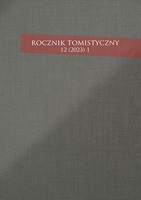Miejsce filozofii w teologii Wincentego Granata
Place of Philosophy in Theology of Wincenty Granat
Author(s): Anton AdamSubject(s): History of Church(es), Contemporary Philosophy, Philosophy of Religion, Sociology of Religion
Published by: Naukowe Towarzystwo Tomistyczne
Keywords: philosophy; theology; Thomism; personalism; Wincenty Granat; The Second Vatican Council;
Summary/Abstract: Wincenty Granat (1900 – 1979) is considered to be one of the Polish precursors of personalism. His personalism is based on a Biblical vision of human being, his approach is realist and comprehensive, and at the same time he takes into consideration the internal and external conditions of human’s development. In his thought Granat followed two major currents of the Christian thought: Thomism and Augustianism. From St. Thomas he adopted the synthetic- comprehensive conception of the world and human being, while in the Augustinian thought he admired the approach toward human being from the perspective of his life dynamism, problems experienced, difficulties, and even existential and social dramas. Following St. Augustin in his theodicy, Granat was discovering God in human being: his truth, conscience, pursue for happiness and search for the sense of life. Against classical philosophical thought Granat argued that philosophy should rather focus on the world of persons, not on the world of things (world of substances) and also that the substantial philosophy in its sheer shape is unable to deal with a description of multi-coloured reality, which is the internal world of human being. That is why the Lublin personalist sought for new ways of approaching a mysterium of human being when attempted to show it in the perspective of a wide spectrum of possible approaches in domain of philosophy, sociology, psychology, theology. It did not however meant the entire departure from the Thomistic thought, as in his research he frequently turned to St. Thomas Aquinas adopting him as an authority and drawing from his thought that what was considered valuable. The Lublin personalist however exceeded Thomism in direction of Augustinianism and both existentialism and phenomenology. What is interesting in Granat’s work is a possibility for tracing how his position developed from the Thomistic thought, dominant in his works prior the Second Vatican Council, to the Christian personalism characteristic for the post-Conciliar period of the Lublin dogmatist.
Journal: Rocznik Tomistyczny
- Issue Year: 1/2023
- Issue No: 12
- Page Range: 171-189
- Page Count: 19
- Language: Polish

